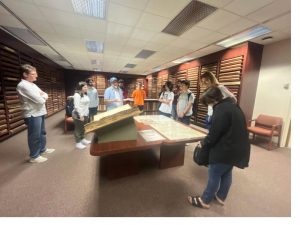CSUN’s NSF REU Site Empowers Next Generation of Computer Scientists
In an era where artificial intelligence and machine learning dominate headlines, the hidden cost of these technological advances often goes unnoticed: energy consumption. Within the College’s Computer Science department, Dr. Xunfei Jiang is leading an innovative National Science Foundation Research Experience for Undergraduates (NSF REU) Site that tackles this energy challenge head-on while opening doors for underrepresented students in computer science.
The NSF REU site, focused on “Applying Data Science on Energy-efficient Cluster Systems and Applications,” provides an intensive 8-week summer research experience for undergraduate students. Running from 2023 to 2025, this program specifically aims to increase participation from groups with limited access to research opportunities in computing across the nation.
The reason for this topic was simple. “Nowadays, artificial intelligence has been widely used in almost every area,” explains Dr. Jiang, “Large-scale data processing and machine learning model training require increasing computing resources… Those data-intensive, computationally intensive workloads consume a lot of energy.”
This focus on energy efficiency makes having students from all walks of life particularly valuable to the research, as they bring unique perspectives shaped by their communities’ experiences with energy access and environmental challenges. Dr. Jiang shares “We would like to build opportunities for students, but especially for underrepresented students to get involved into research. By participating in research, students get to learn up-to-date knowledge, explore cutting-edge technology and strategies researches proposed to solve energy-efficiency challenges.”
Students who have joined receive daily training sessions from Monday through Thursday in the first 4 weeks over the summer, covering research methodologies, technical skills, and data science knowledge. They gain hands-on experience with parallel and distributed computing, learning to improve program efficiency using parallel computing. Alongside this training, students also participate in professional development activities, including research seminars, resume composition, poster and paper compositions, and graduate school application workshops with alumni panel discussions. Each cohort concludes the program by presenting their research at the Southern California REU Poster Symposium. Students participated in in the symposiums at University of Southern California in summer 2023 and Harvey Mudd College for their presentations in summer 2024.
With this access and training, the program’s impact is already showing promising results. “In the last year, we’ve had three papers published, and for year 2024 we had 8 research papers were published.” shares Dr. Jiang. Projects at the REU Site have ranged from workload management in data centers to prediction of wildfire risk, along with work in energy prediction automobile AC systems and optimization of durability and energy efficiency in Phase Change Memory in data storage.
The program also includes practical site visits to data centers at CSUN, providing real-world context for the energy efficiency focus. “When they come into the data center, they know how much heat was generated by the servers and why this cooling could take up to 40% of the cost in data centers, so [the students learn first-hand how] reducing energy consumption is important,” Dr. Jiang notes.
In Nov 8, 2024, the REU Site hosted a workshop on “Data Science and Energy-efficient Computing” to demonstrate the research outcomes with more than 60 participants from 7 different universities and community colleges. In this workshop, Two experts from Data Science (Dr. Yuan Tian from UCLA and Dr. Myung Cho from CSUN) gave keynotes talks for our workshop. The workshop also had 5 project oral presentations, a REU research experience sharing presentation, and a poster session with 9 research projects related to data science and energy-efficient computing.

Lab visit to the Geography and Environmental Science department. Photo by Dr. Xunfei Jiang.
The program continues to evolve, with plans to expand and engage more students interested in data science and energy-efficient computing. Students receive a $700 weekly stipend for the 8-week period, along with housing and meal allowances, making the opportunity accessible to a broader range of participants. This financial support ensures the program remains accessible to talented students from colleges and universities across the nation.
The 2025 summer research session runs from June – July 2025. For this session, 7 mentors, 10 undergraduate students, and 5 master student mentors joined the REU Site at CSUN. Students involved in other groups such as the Louis Stokes Alliance for Minority Participation (LSAMP) or the Autonomy Research Center for STEAHM (ARCS) are encouraged to apply.
For prospective REU applicants, Dr. Jiang emphasizes the program’s competitive nature: “Every year there are more than 100 students who apply to our REU site.” She advises candidates to “prepare earlier, starting looking for opportunities in early January.” and to clearly express “why you are interested in the REU site, which project you’re interested in and what relevant experience may help you to contribute to the project.”
Through this innovative program, Dr. Jiang and CSUN are cultivating the next wave of computer scientists who bring both technical expertise and diverse perspectives to the critical challenge of sustainable computing. As these students advance their research in energy-efficient systems and applications, they’re pioneering solutions that will shape how we approach technological sustainability for generations to come.
Revolutionizing Prosthetic Control: CSUN’s Smart Prosthetics Project
September 1, 2024
Leave a reply Cancel reply
-
Student Competitions: AeroDef – Manufacturing Challenge
February 6, 2014 -
New faculty aim to make their mark
November 30, 2012 -
CCPT grant starts off on the right foot
March 25, 2016


